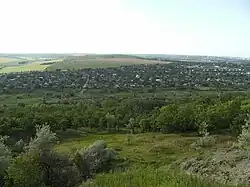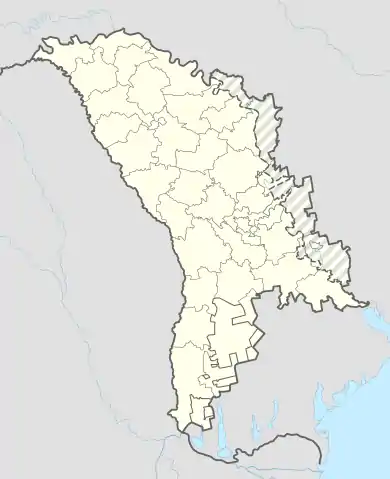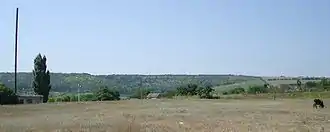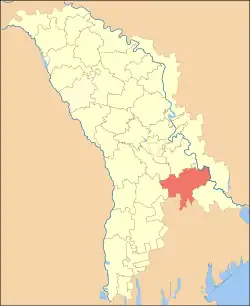Gîsca
Gîsca (meaning "[The] goose" in Romanian; Russian: Гиска) is a village near in Căușeni District, Moldova, composed of a single village with the same name, population 4,841 at the 2004 Census. The locality, although situated on the right (western) bank of the river Dniester, immediately to the south-west of the city of Tighina (Bender), in the Bessarabian, not Transnistrian part of Moldova, is under the control of the breakaway Transnistrian authorities.
Gîsca
Гиска | |
|---|---|
Village | |
 | |
 Gîsca | |
| Coordinates: 46°46′44″N 29°25′30″E | |
| Country (de jure) | |
| District (de jure) | Căușeni |
| Country (de facto) | |
| Municipality (de facto) | Bender |
| Government | |
| • Mayor | Valerii Covcean (Валерий Алексеевич Ковчан) |
| Elevation | 16 m (52 ft) |
| Population (2004) | 4,400 |
| Time zone | UTC+2 (EET) |
| • Summer (DST) | UTC+3 (EEST) |
| Postal code | MD-3200 |
| Climate | Cfb |

The village is located around a creek named Gîrla, which flows into the Dniester. The creek is small and not navigable, but it is the habitat of ducks and geese, which gave the name to the locality. The road south-west from the city of Tighina (Bender) follows into the Moldovan-controlled area immediately as the village of Gîsca ends, and the next village of Fîrlădeni starts.
At the census organized by the Transnistrian authorities in 2004, there were 4,841 inhabitants in Gîsca, including 819 (16.91%) ethnic Moldovans, 2,956 (61.06%) ethnic Russians, 719 (14.85%) ethnic Ukrainians, 168 (3.47%) ethnic Bulgarians, 91 (1.88%) ethnic Gagauzians, 22 (0.45%) ethnic Germans, 8 (0.17%) ethnic Belarusians, 7 (0.14%) ethnic Jews, 0 to 16 (0.17%) Armenians, 0 to 12 (0.12%) Poles, 0 to 5 (0.04%) Gypsies, and 13 to 44 (0.60%) others and non-declared.
In June 1992, during the War of Transnistria the village was the scene of alleged human rights abuses by Moldovans. According to a report of the Russian human rights organisation, "Memorial", members of the local armed Transnistrian paramilitary unit were killed in this village during a gun-battle with Moldovan forces. The Moldovan troops were said to have been finishing off the wounded. At least three villagers were killed by stray bullets and fragments of shells. Two more villagers were beaten by Moldovan volunteers, mopping up the village. On several occasions unprovoked fire was opened at the houses of villagers (there were no victims).[2]
References
- Transnistria's political status is disputed. It considers itself to be an independent state, but this is not recognised by any UN member state. The Moldovan government and the international community consider Transnistria a part of Moldova's territory.
- Memorial, Bender, Moldova
